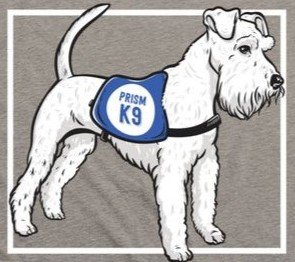The Mighty Benefits of Small Service Dogs
When it comes to service dogs, many people immediately picture larger breeds like Golden Retrievers, Labrador Retrievers, or German Shepherds. However, small dogs have a unique set of qualities and advantages that make them exceptional service companions for individuals with various needs. In this blog post, we'll explore the numerous benefits of small dogs as service animals and shed light on the valuable roles they play and quickly touch on the similarities between the different sizes of service dogs.
1 —
Accessibility and Maneuverability:
One of the significant advantages of small service dogs is their size. They are often more accessible for individuals who may have mobility challenges or live in smaller spaces. Small dogs can comfortably fit in tight spaces like crowded buses, elevators, or airplanes, making them ideal for people who require constant assistance.
Small service dogs are easier to carry when necessary. Handlers can pick them up and carry them in a tote bag or carrier, especially in situations where it's safer or more practical than having the dog walk. This portability can be particularly beneficial in busy environments.
Smaller dogs generally require less space and lower maintenance compared to larger breeds. They are well-suited for individuals living in apartments or homes with limited outdoor areas. Their reduced dietary needs (as in, small portions) and easier bathing can also be more manageable for handlers.
Despite their size, small service dogs can be trained to perform specific tasks effectively. For instance, they can assist with retrieving dropped items, turning on lights, or alerting to medical issues like low blood sugar or seizures.
2 —
Temperament and Versatility
Small dogs are known for their affectionate and nurturing personalities. They excel in providing emotional support and companionship to their handlers, offering comfort during challenging moments and reducing stress and anxiety.
Smaller breeds are often more handler-focused, whereas the “Big Three” service dog breeds tend to soliciate attention from any human.
For children with disabilities or special needs, small service dogs can be an excellent choice. They are less intimidating for young individuals and can provide essential support in school settings or during therapy sessions.
Small breeds have many different temperaments, which can be specifically chosen for an individual human.
3 —
Individuality and Longevity
Small dog breeds generally have longer lifespans than larger breeds. This means that they can serve as loyal and reliable companions for an extended period, providing consistent support to their handlers.
Small dogs often have shorter training periods due to their reduced physical requirements and earlier maturity. This can mean a quicker turnaround for matching a handler with a trained service dog.
The choice of a service dog should always align with the specific needs of the handler. For some individuals, small dogs are the perfect match due to their unique qualities, making them a highly customizable option in the realm of service animals.
4 —
Similarities Between Larger and Smaller Breeds:
Relationship with handler
Desire to work and ability to do a task
Specialized breeding, training, and care throughout their lifetime
In conclusion, small dogs can be incredible service companions, offering a host of benefits that cater to the diverse needs of individuals with disabilities. Their accessibility, adaptability, and unwavering devotion make them a mighty force in the world of service dogs, proving that greatness truly comes in all sizes.

